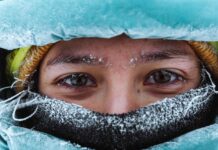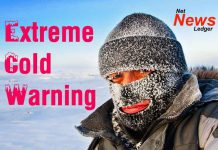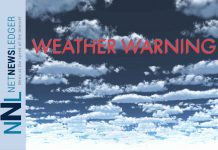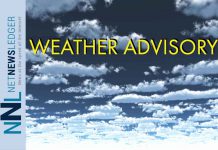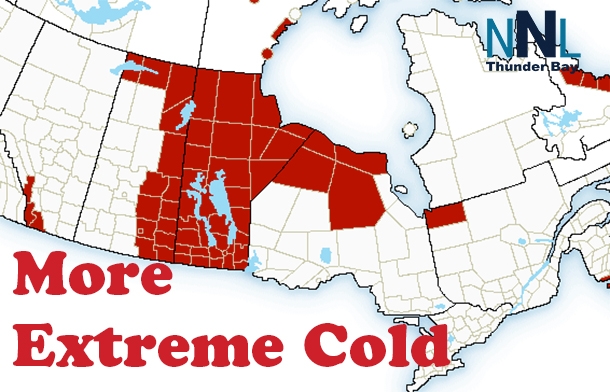
THUNDER BAY – WEATHER – Extreme Cold is returning to Northern Ontario. Environment Canada has issued warnings for the far north in the province.
To the west, most of Manitoba, right up to the Ontario border is also under Extreme Cold Warnings. These warnings include the City of Winnipeg.
For the City of Thunder Bay, this morning the windchill is at -34c.
The forecast is calling for a mix of sun and cloud. Winds up to 15 km/h. High minus 12. Wind chill minus 34 this morning.
Later tonight, the windchill in Thunder Bay will hit the -40c range again.
For Northern Ontario:
Extreme Cold Warning in effect for:
- Big Trout Lake – Kasabonika
- Sachigo Lake – Bearskin Lake
- Webequie – Fort Hope
- Fort Severn – Washaho Cree Nation
- Peawunuk
Environment Canada says, “A prolonged period of very cold wind chills is expected.
“Bitterly cold temperatures combined with brisk winds are generating extreme wind chill values near or below minus 40 early this morning. Extreme wind chill values will moderate later this morning as temperatures climb but are expected to redevelop again tonight and last through Sunday morning as even colder air moves into the area.
“While anyone who isn’t dressed warmly is at risk in cold weather conditions, some are at greater risk than others for frost bite and hypothermia:
– homeless people
– outdoor workers
– people living in homes that are poorly insulated (with no heat or no power)
– people with certain medical conditions such as diabetes, peripheral neuropathy and diseases affecting the blood vessels, people taking certain medications including beta-blockers
– winter sport enthusiasts
– people who consume excess alcohol
– infants and
– seniors.
Watch for cold related symptoms and complaints which include:
– Respiratory: shortness of breath, wheezing and cough
– Cardiovascular: chest pain and arrhythmias
– Circulation: colour change of finger and toes, pain, numbness and tickling sensation in extremities
– Muscle: pain, stiffness, swelling, restricted movement, weakness
– Skin: itching, pale.
If you experience these symptoms when exposed to the cold, move indoors and begin warming.
Wear appropriate clothing.
– Always wear clothing appropriate for the weather. Synthetic and wool fabrics provide better insulation. Some synthetic fabrics are designed to keep perspiration away from your body which keep you dry and further reduce your risk.
– Dress in layers with a wind resistant outer layer. You can remove layers if you get too warm (before you start sweating) or add a layer if you get cold.
– Wear warm socks, gloves, a hat and scarf in cold weather. Be sure to cover your nose to protect it.
– If you get wet, change into dry clothing as soon as possible. You lose heat faster when you’re wet.
Protect yourself.
– On sunny days wear sun glasses, lip balm and sunscreen to protect your skin from UV and keep it moisturized to help prevent windburn.
– Wear a face mask and goggles if you are participating in winter activities such as skiing, snowmobiling and skating to protect your face from frostbite and windburn.
– Keep moving (especially your hands and feet) to keep your blood flowing and maintain your body heat.
– Drink enough fluids, but avoid very cold drinks and consume warm meals regularly.
Extreme cold warnings are issued when very cold temperatures or wind chill creates an elevated risk to health such as frost bite and hypothermia.

